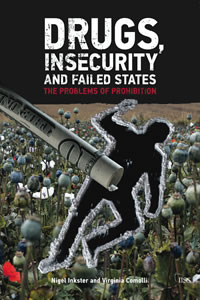Mexico's "Caravan for Peace" Heads to Washington [FEATURE]
The Mexico-based Caravan for Peace and Justice and its American allies are now more than halfway through their 6,000-mile, 27-city journey to focus attention on the drug war's terrible toll in both countries. After beginning two weeks ago in San Diego, the caravan has now traversed California, Arizona, New Mexico, and miles and miles of Texas, and on Wednesday, was set to join with African-American and other activists to march over the historic Edmund Pettus Bridge into Selma, Alabama.

While on Wednesday, the theme of the day's events was to be "the new Jim Crow" and the mass criminalization and incarceration of large numbers of African-Americans through the war on drugs, that is only one of the themes the caravan is emphasizing in its bid to put the harms of the drug war on full view for the American public and its politicians.
Led by Mexican poet Javier Sicilia, the caravan said it wants put faces on Mexico's drug war dead -- who are too often assumed to have been "bad" by virtue of having been killed.
"Our purpose is to honor our victims, to make their names and faces visible," Sicilia said. "We will travel across the United States to raise awareness of the unbearable pain and loss caused by the drug war -- and of the enormous shared responsibility for protecting families and communities in both our countries."

"Drug War policies: We propose the need to find a solution, with a multidisciplinary and intergenerational approach that places individuals, and their welfare and dignity, at the center of drug policy. We call on both the Mexican and the U.S. community to open and maintain a dialogue about alternatives to Prohibition based on evidence, and which is inclusive in its considerations of the diverse options for drug regulation.
"Arms trafficking: We propose that the President of the United States immediately prohibit the importation of assault weapons to the United States. Assault weapons are often smuggled into Mexico, and have also been used too many times against innocent civilians in the US. We propose giving authorities effective regulatory tools and adequate resources to halt arms smuggling in the border regions, especially in border states like Arizona and Texas.
"Money laundering: We call for governments on both sides of the border to take concrete steps to combat money laundering. We propose that financial institutions be held accountable for preventing money laundering through increased government surveillance, investigations, fines and criminal charges. We also call for the Treasury Department to immediately implement Congress’ 2009 call to close the "prepaid/stored value cards" loophole.
"US foreign aid policy: We call for a change from the United States' "war" focus to one of human security and development that contemplates promoting the healing of Mexico's torn social fabric. We propose the immediate suspension of US assistance to Mexico's armed forces. The "shared responsibility" for peace that both governments share must begin with each country complying with its own respective national laws.
"Immigration: We call for a change in the policies that have militarized the border and criminalized immigrants. These policies have generated a humanitarian crisis driven by unprecedented levels of deportations and incarceration of migrants. In addition, these policies have also inflicted immeasurable environmental damage. We call for protecting the dignity of every human being, including immigrant populations that have been displaced by violence who are fleeing to the US seeking safe haven and a better life."
The Caravan is a natural outgrowth of Sicilia's Mexican Movement for Peace and Justice with Dignity (MMPJD), which he formed after his son and several comrades were kidnapped and murdered by drug cartel gunmen in Cuernavaca in March 2011. It is designed to put names and faces on the estimated 60,000 dead, 10,000 disappeared, and 150,000 displaced by the prohibition-related violence pitting the so-called cartels against each other and the Mexican state.
In Mexico, the MMPJD struck a deep chord with a population increasingly angered and frightened by the often horrific violence raging across the country. Caravans organized by the MMJPD crisscrossed the country last year before bringing 100,000 people to mass in Mexico City's huge national plaza, the Zocalo in June. The mass outpouring of grief and anger convinced President Felipe Calderon to meet with Sicilia, who brought along photos of some of the dead depicting them as happy, smiling human beings.memorial representing victims of the Monterrey Casino Royale attack
"The powers that be were trying to tell us that all those who were dying were just criminals, just cockroaches," Sicilia explained. "We had to change the mindset, and put names to the victims for a change."
In Texas last week, the caravan traveled the breadth of the state, stopping in El Paso, Laredo, McAllen, San Antonio, Austin, and Houston before heading into the final half of the tour. In Austin, groups such as Law Enforcement Against Prohibition (LEAP) and local NORML affiliates joined the travelers.
"I think what is important is the binational nature of this caravan," said Roberto Lovato, the founder of Presente.org, an online Latino advocacy organization. "The drug war has been a fantastic failure here in the United States, if you look at more than 2 million people being incarcerated, families destroyed by that incarceration, a trillion of our tax dollars utterly wasted. So we have law enforcement officers who lost their brothers and their sisters in the law enforcement world, and people who have lost family members in Mexico."El Paso
"The drug problem isn’t just an American problem, and the harm that prohibition of drugs causes in the world is phenomenal," said LEAP member and Texas resident Terry Nelson, who spent more than three decades in federal law enforcement. "Hundreds of thousands are dying in the Western Hemisphere alone, it’s got to stop," he said. "The drug war is a war on people, it's not a war on drugs."
In Houston, state Rep. Sylvester Turner (D-Houston) presented Sicilia with a non-binding resolution praising his efforts and criticizing the drug war.
"Although our nation spends in excess of $40 billion a year combating the drug trade, the United States remains the principal destination for drugs produced in and transported through Mexico," the resolution said. "Moreover, many of the firearms found at crime scenes in Mexico have been traced to sources in the United States; interdiction initiatives have not resulted in the decline of drug abuse."Javier Sicilia with the LEAP vanAlong the way, the caravan has touched on a number of intersecting issues. Javier Sicilia himself told Maricopa County Sheriff Joe Arpaio to treat his prisoners better, and the caravan has visited immigrant detention centers to criticize US policies toward undocumented immigrants. Similarly, in Houston, group members purchased a pistol and an AK-47 at gunshow, then dismantled the rifle, transforming into a peace symbol in line with its calls on the US government to crack down on the flow of firearms south of the border. And above all, the call for the respect for human rights has been a constant on the caravan.
The caravan is set to arrive in Washington, DC, on September 10 for events scheduled the following day. So far, it is succeeding in its aim of bringing attention to the harms of the drug war on both sides of the border -- a Google news search for "caravan for peace" now shows 2,660 results. That number was at 145 when last we wrote about the caravan two weeks ago.
Many more photos are available on the Caravan's Flickr page.Book Review: Drugs, Insecurity, and Failed States: The Problems of Prohibition
Chronicle Book Review: Drugs, Insecurity, and Failed States: The Problems of Prohibition by Nigel Inkster and Virginia Comolli (2012, Adelphi, 163 pp. PB, $12.50)
Longtime readers of Drug War Chronicle likely are already familiar with many -- but not all -- of the topics in Drugs, Insecurity, and Failed States. The Chronicle has been on the ground and reported back from Afghanistan, Colombia, and Mexico -- all of which get individual chapters in this new book -- on the problems generated by drug prohibition in those producer and/or transit nations.
We've also reported to a lesser extent on the drug war's impact on Central America, but almost not at all on its impact in the countries of West Africa, which has become an important staging ground for drug flows from Latin America to Europe and the Middle East. Drugs, Insecurity, and Failed States has individual chapters on these two regions as well.
Even though some of the information is new, the book's thesis should also be familiar to Chronicle readers: The present drug prohibition regime is not only failing to win the war on drugs, it is also setting off and prolonging violent conflict -- both political and criminal -- in producer and transit countries.
We have certainly seen that in spades in the past few decades. In Mexico, which is both a producer and a transit state, the multi-sided drug wars pitting the so-called cartels against each other and the state have left more than 50,000 dead in six years and shaken public confidence in state institutions. In Colombia, profits from the illicit coca and cocaine trade fund leftist guerrilla armies -- one of which, the FARC, has been at war with the state since 1964 -- and rightist paramilitaries alike. In Afghanistan, which supplies almost 90% of the world's opium and the heroin derived from it, both the Taliban and elements of the Afghan state are profiting handsomely from the illicit trade.
Drugs, Insecurity, and Failed States provides succinct, yet fact-filled overviews of the deleterious effects of prohibition in all three countries, as well as West Africa and Central America. In all of them, the lure of the profits of prohibition exceed the threat of law enforcement or the ability of the state to suppress the black market economy. That's not news.
What is newsworthy about Drugs, Insecurity, and Failed States is who has produced it. The authors, Nigel Inkster and Virginia Comolli, are, respectively the director of Transnational Threats and Political Risk at the London-based International Institute of Strategic Studies (IISS) and a research analyst at that august institution. Not only that, Inkster is a veteran of the British Secret Intelligence Service who spent his last two years as the Assistant Chief and Director for Operations and Intelligence.
The IISS, which was founded to manage the Cold War for the West more than half a century ago, describes itself as "the world's leading authority on political-military conflict." With many former US and British government officials among its members, IISS very much is the establishment, an organ of the global security elite.
When the IISS says a policy has not only failed but has produced counterproductive results, governments tend to listen. Now, we have the IISS quite clearly and vehemently saying that drug prohibition has done both. And that's what makes Drugs, Insecurity, and Failed States so remarkable -- not that we want to give short shrift to the cogent analysis in the book.
It is noteworthy that the authors also take on the international drug control bureaucracy based in UN agencies such as the International Narcotics Control Board (INCB) and the Office on Drugs and Crime. They chide the INCB for not only failing to control the illicit drug traffic, but also with failing to uphold the other part of its mandate: ensuring an adequate supply of opiate-based pain medications. Noting that a handful of Western countries account for a staggering 80% or more of all opioid pain medication usage, Inskter and Comolli clearly think vast portions of the planet are not getting sufficient pain medications, and they blame the INCB. To be fair, though, they also acknowledge other obstacles to the effective treatment of pain in developing nations.
Drugs, Insecurity, and Failed Statesis also useful for its discussion of the alternatives to prohibition and what decriminalization or legalization would and would not achieve. Decriminalization would be a benefit to drug users, they argue, citing the Portuguese experience, but would not address black market profits. And legalization would certainly weaken, but is unlikely to eliminate, the violent criminal organizations running amok in places like Mexico and Central America.
For politically motivated actors, such as the FARC in Colombia and the Taliban in Afghanistan, for which the profits of the drug trade are not an end in themselves, but a means to achieving political goals, legalization would have little impact, except on their revenue streams. Such groups would find other means to continue, Inkster and Comolli suggest.
The book also discusses the prospects for trying to change the global prohibition regime, which is based on the 1961 Single Convention and its two successor treaties. The outlook is not sunny, the authors suggest, given a distinct lack of interest in reforms by such major players as the United States, China, and Russian, not to mention the lack of a hue and cry for change from regions including Africa, the Middle East, and Southeast and East Asia.
But even within the ambit of the global prohibition regime, there is a bit of room for experimentation. The INCB could try to find less restrictive interpretations of the treaties, and the Office on Drugs and Crime could shift its emphases. That could result in some small openings, perhaps for supervised injection sites or heroin maintenance and the like, but not in major changes and not in an end to global drug prohibition.
Drugs, Insecurity, and Failed States concisely restates some old arguments and adds a few new ones, and it provides handy overviews of the problems of prohibition in producer and transit countries. One can only hope that members of the policymaking circles at which it is aimed actually pick it up and read it because the global security establishment is telling them in no uncertain terms that not only is prohibition not working, it's making matters worse.
NAACP Regional Chapters Endorse CO, OR, WA Marijuana Initiatives
All three marijuana legalization initiatives on state ballots this year have won the endorsement of National Association for the Advancement of Colored People (NAACP) regional organizations this week. Last Wednesday, the Colorado, Montana, and Wyoming conference of the NAACP endorsed the Colorado initiative, and last Friday, the Alaska, Washington, and Oregon conference of the NAACP endorsed the Washington initiative. That same conference endorsed the Oregon initiative earlier this month.
The Colorado initiative, Amendment 64, has already won the support of a growing list of organizations, including the Democratic and Libertarian Parties of Colorado, the Colorado Criminal Defense Bar, and the Colorado Criminal Justice Reform Coalition. Similarly, the Washington initiative, I-502, also has a growing list of endorsers, including the King County (Seattle) Bar Association, the Washington State Labor Council of the AFL-CIO, the Green Party, the state Democratic Party, and numerous county and local Democratic Party groups. Likewise, the Oregon initiative, Measure 80, is busily picking up endorsements as well, including that of the Libertarian Party presidential ticket.
"In ending the prohibition against adult use of marijuana, we might affect mass incarceration and its disproportionate impact on African-Americans and other people of color," said Rocky Mountain states regional NAACP president Rosemary Harris-Lytle.
"Treating marijuana use as a crime has not only failed, it has perpetuated racial inequities through unequal enforcement," said Pacific Northwest regional president Oscar Eason, Jr. "African Americans are no more likely than whites to use marijuana, but we are much more likely to be arrested for it."
Every endorsement counts in what will be a nail-biter of a campaign in both states. According to recent polls, the Colorado and Washington initiatives are leading, but are only hovering around the 50% support level. It takes 50% plus one to win, and veteran initiative watchers say initiatives should be polling at least 60% as the campaigns head into the home stretch because some support is soft and likely to be peeled off by last minute opposition campaigning.
In Colorado, an early August Public Policy Polling survey of likely voters had Amendment 64 leading 49% to 40% and trending upward from an earlier PPP poll that had it leading 46% to 42%, but still not over 50%. In Washington, a July Public Policy Polling survey had I-502 leading 50% to 37% and trending upward over an earlier PPP poll that had it leading 47% to 39%, but still not over 50%. The battle looks to be a little tougher in Oregon, where a July Public Policy Polling survey asking a generic question about whether marijuana should be legalized had 43% saying yes and 46% saying no.
Look for in-depth reporting on these three marijuana legalization initiatives and their prospects after the Labor Day holiday.Medical Marijuana Update
The battle of Los Angeles continues, Arizona prosecutors don't like their medical marijuana law, and a bill is pre-filed in Kentucky. There's also lots more going on. Let's get to it:
Arizona
Last Thursday, state and county prosecutors challenged the medical marijuana program in court. Attorney General Tom Horne and Maricopa County Attorney Bill Montgomery asked a court hearing a dispensary application case to rule that the voter-approved law is illegal because it conflicts with federal drug laws. The Republican prosecutors are specifically targeting the dispensary provisions of the law, but argued in court that all aspects of the state law violate federal drug laws. In the case at hand, a would-be Maricopa County dispensary is suing the county because officials wouldn't provide zoning clearances required under the law. The officials had been advised by Montgomery that county employees could face prosecution for aiding and abetting drug crimes.
Arkansas
As predicted last week, Arkansas state officials announced that a medical marijuana initiative has qualified for the ballot. The Arkansas Medical Marijuana Act would allow patients suffering from specified diseases or medical conditions to use marijuana with a doctor's recommendation. It envisions a system of state-licensed nonprofit dispensaries, and would allow patients or their caregivers to grow their own only if they are not within five miles of a dispensary. In that case, patients could grow up to six flowering plants. Patients could possess up to 2 ½ ounces of marijuana.
California
Last Wednesday, Los Angeles asked the DEA to help it shut down dispensaries. The request came from Councilman Bernard Parks, who filed a successful motion with the council. Parks is a former LA police chief. The council recently voted to close down all dispensaries in the city, although that is likely not the end of the affair (see below).
Also last Wednesday, a judge in Riverside ruled that the city can't ban a dispensary. Riverside County Superior Court Judge John Vineyard dissolved an injunction to shut down a dispensary in the city, agreeing that current law makes local government closures of the clinics unconstitutional. The decision affects The Closet Patient Care dispensary on Elizabeth Street in Riverside, but could be a precedent for other cases in the city. The city immediately said it would appeal the ruling.
Also last Wednesday, a Costa Mesa collective filed suit against the city over its ban on dispensaries. The Green Health Association argues that the city cannot legally ban nonprofit collectives and says it is operating with the state attorney general's guidelines.
Also last Wednesday, the city of Chowchilla banned public medical marijuana use. It passed an ordinance limiting smoking or any other type of medical marijuana consumption to inside a private residence and requiring all cultivation to take place in an enclosed, locked area.
Also last Wednesday, the California Supreme Court dismissed Pack vs. Long Beach, a case that could have decided whether cities can lawfully regulate medical marijuana. The court held the case was moot after the attorney for the petitioners abandoned his original argument that Long Beach's short-lived rules to allow and regulate medical marijuana violated federal law. The state Supreme Court is still considering several other cases that will determine the power of cities to ban collectives or dispensaries.
On Tuesday, word spread that the Berkeley Patients Group would reopen in a new location. The iconic dispensary had been forced to close in May after federal prosecutors threatened its landlord with seizure of his property. The new location is just four blocks from its original location on San Pablo Avenue. No opening date has been set at the new site and officials from Berkeley Patients Group refused to go on record about their plans.
Also on Tuesday, Butte County's effort to ban outdoor grows hit a bump in the road. Butte County District Attorney Mike Ramsey surprised supervisors by announcing the ordinance was unconstitutional as written. The ordinance envisioned charging violators with a misdemeanor, but the prosecutor said that was the domain of state law, not county ordinances. Now, it's back to the drawing board for the supervisors.
Also on Tuesday, the Wheatland city council banned dispensaries within the city limits. It passed two ordinances, one banning dispensaries and the other barring outdoor grows within the city limits and setting conditions on indoor ones.
On Wednesday, activists in Los Angeles turned in more than 50,000 signatures on petitions seeking a referendum to overturn the city council's recently-passed ban on dispensaries. The city now has 30 days to either rescind the ban or to call a special election to let the voters decide. That could come in March or May.
Kentucky
On Monday, state Sen. Perry Clark (D-Louisville) pre-filed a medical marijuana bill for the 2013 session. He said he wanted to get a head start on building support in the legislature.
Montana
On Tuesday, the co-founder of Montana Cannabis agreed to plead guilty to a federal drug charge related to 2011 raids on dispensaries across the state. Chris Lindsay faces up to 20 years in federal prison for conspiracy to operate a drug-involved premises. Lindsay said he copped to the plea agreement to avoid other pending charges and because earlier court rulings made it clear he would not be able to testify about his belief that Montana Cannabis was in compliance with the state’s law. Lindsay is also the public face of the Montana Cannabis Industry Association, which has filed a lawsuit to block portions of the law rewritten by the Republican legislature and which is backing a referendum asking voters to repeal the law. That referendum will be on the November ballot.
Oregon
On Sunday, activists said they would try to get PTSD added to the medical marijuana list of qualifying conditions. Two previous efforts have failed. This time, the push is being led by veteran's groups. Oregon is home to some 300,000 veterans.
Washington
Last Thursday, the DEA sent threat letters to 23 dispensaries operating near schools. In the letters to the dispensaries, DEA Special Agent-In-Charge Matthew Barnes contended the dispensaries could face the seizure and forfeiture of assets, as well as criminal prosecution. The letter informs dispensary operators and property owners to cease the sale and distribution of marijuana within 30 days.Massachusetts Medical Marijuana Initiative Polling Very Well
It looks like Massachusetts is set to become a new medical marijuana state. According to a new Public Policy Polling survey, the medical marijuana initiative there has the support of 58% of likely voters, while only 27% say they plan to vote against it.
The initiative, which will appear on the November ballot as Question 3, would allow people suffering from a debilitating medical condition to use medical marijuana upon the recommendation of a doctor with whom they have a bona fide relationship. Patients could possess up to a 60-day supply -- what constitutes that supply will be determined by the Department of Health. The initiative would also set up a system of nonprofit medical marijuana cultivation and distribution centers.
The initiative is being championed by the ACLU of Massachusetts, the Committee for Compassionate Medicine, and the Massachusetts Patient Advocacy Alliance.
The PPP survey found that Question 3 is winning broad support among Democrats (67%) and independents (55%), but also surprisingly high support (46%) among Republicans. Following the pattern in other states, support was stronger among men (61%) than women (55%) and stronger among people describing themselves as very liberal (77%), liberal (67%), and moderate (60%), than among those describing themselves as conservative (41%) or very conservative (37%).
Even if all the undecided voters (15%) joined those saying they will vote no, the measure would still win by 16 percentage points. Some drop-off in support is to be expected as election day nears and the opposition mobilizes, but it looks very likely that there will be at least 18 states to approve medical marijuana as of November.Medical Marijuana Initiative Makes Ballot in Arkansas
An Arkansas initiative to legalize medical marijuana appears has qualified for the November ballot, state officials announced Monday. After a first round of signature-gathering came up short, the group sponsoring the initiative, Arkansans for Compassionate Care, redoubled its efforts, turning in some 74,000 signatures in a bid to come up with the 26,000 additional valid voter signatures it needed to qualify. That did the trick.
"Our office verified over 69,000 signatures for Arkansans for Compassionate care," the secretary of state's office announced Monday afternoon. The group needed more than 62,000 valid signatures to qualify.
That means Arkansas will become the first southern state to vote directly on whether to okay the use of medical marijuana. Voter initiatives to legalize medical marijuana have never failed, with one exception: South Dakota, which twice turned them back.
The Arkansas Medical Marijuana Act would allow patients suffering from specified diseases or medical conditions to use marijuana with a doctor's recommendation. It envisions a system of state-licensed nonprofit dispensaries, and would allow patients or their caregivers to grow their own only if they are not within five miles of a dispensary. In that case, patients could grow up to six flowering plants. Patients could possess up to 2 ½ ounces of marijuana.
Seventeen states and the District of Colombia already recognize the medical use of marijuana. Voters in Arkansas will by joined by voters in Massachusetts in deciding in November whether to join the ranks of the medical marijuana states.California Drug Overdose Prevention Bill Passes
A bill aimed at saving the lives of drug overdose victims by protecting those who would come to their assistance from prosecution on drug charges passed the California legislature Monday on a bipartisan vote of 54-22 in the Assembly. It had already passed the Senate. The vote came days before International Overdose Awareness Day.
In recent years, Californians have been dying of drug or alcohol overdoses at a rate of ten a day, with the number of fatal overdoses increasing by 24% between 2000 and 2006, according to supporting documentation within the bill.fatal drug overdose (wikimedia.org)
Introduced by Assemblyman Tom Ammiano (D-San Francisco), the bill, Assembly Bill 472, provides that neither the overdose victim nor a person who seeks emergency treatment for him shall be charged with the crime of drug possession or being under the influence of drugs, provided the drugs are for personal use.
Such bills are known as "Good Samaritan" bills and have already been passed nine other states.
In asking his colleagues to vote for the measure, Ammiano noted that more people die from drug overdoses than in car crashes. Fewer would die, he said, if witnesses sought prompt emergency help, but some hesitate for fear of being arrested for their drug use or possession. That argument got through to members of both parties.
"This is not going soft on crime," said Assemblyman Donald Wagner (R-Irvine). While he added that he does not condone drug use, he said it was necessary to "overlook some indiscretions for the greater good."
"It's critically important to save lives," said Assemblywoman Kristen Olsen (R-Modesto). "This bill doesn't condone drug behavior."
"It's not going to encourage underage use," noted Assemblyman Mike Feuer (D-Los Angeles). On the contrary, he said, the knowledge that overdose is so life-threatening should encourage users to reevaluate their behaviors.
"It's time we started saving lives in California," said Ammiano.
The bill was lobbied for by the Drug Policy Alliance, and supported by a range of organizations including California Society of Addiction Medicine, California Attorneys for Criminal Justice; California Professional Firefighters, California Association of Alcohol and Drug Program Executives County Alcohol and Drug Program Administrators Association of California, National Council of Alcohol and Drug Dependence of the San Fernando Valley, National Association of Social Workers, Asian Pacific AIDS Intervention Team, Bay Area Addiction Research and Treatment, Families ACT!, Grief Recovery After a Substance Passing and Parents for Addiction Treatment and Healing.
The only group to officially oppose it was the California Sheriff's Association.
The bill now goes to the desk of Gov. Jerry Brown (D).Springfield, Missouri, Decriminalizes Marijuana Possession, But...
The Springfield, Missouri, city council voted 6-3 Monday night to adopt an ordinance decriminalizing the possession of small amounts of marijuana, but immediately announced plans to amend it or even gut it. The council was forced either to adopt the ordinance or place it before the voters on the November ballot after activists from Show-Me Cannabis Regulation gathered enough signatures to bring the proposal forward.
The ordinance reduces the penalty for possession of up to an ounce and a quarter of pot to a maximum $150 fine. It also requires the council to create an oversight committee to monitor the ordinance and it allows violators to have their records expunged after two years.
The vote came after the city attorney told the council the city has no authority to expunge records under state law. The city attorney also said an initiative ordinance cannot require the city to form an oversight committee.
Council members said they voted for the ordinance mainly to avoid the $180,000 cost of putting it to the voters and that they would work to fix what they saw as problems with it.
"It doesn't do what the petitioners want; it just fouls up the system," Councilman John Rush complained.
It isn't clear exactly what changes the council has in mind. One councilman, Tom Bieker, said he wants to amend it "to the extent we are comfortable with," while Mayor Robert Stephens said the council might try to "correct the faulty areas."
The council will present possible amendments for consideration as part of an emergency bill when it meets on September 10. But in the meantime, Springfield has decriminalized marijuana possession.Medical Marijuana Bill Introduced in Kentucky
The Kentucky legislature will be grappling with medical marijuana next year. State Senator Perry Clark (D-Louisville) Monday pre-filed a bill for the 2013 legislative session, saying he wanted to get a head start on building support at the state house.
The bill, next year's Senate Bill 11, would allow patients with a doctor's recommendation to use marijuana to alleviate the symptoms of serious medical conditions, including HIV/AIDS, cancer, and multiple sclerosis, among others. It would also create a network of state-regulated dispensaries. Registered patients and their caretakers could opt to grow their own. The bill specifies that patients or caregivers could possess up to six ounces of marijuana and up to 12 mature and 12 immature plants.
"This is not a conservative issue or a liberal issue; it’s an issue of compassion," said Senator Clark. "Countless studies show that marijuana is effective at treating pain, nausea, loss of appetite, and other symptoms. If it was my family member, I would do anything to relieve their suffering."
The cannabis-friendly Clark -- he has previously introduced bills to legalize industrial hemp and to honor pioneering Kentucky marijuana activist Gatewood Galbraith after his death in January -- took pains to emphasize that this bill is only about medical marijuana.
"This is not about legalizing marijuana," he said. "It's about getting government out of healthcare, and putting science in."
Donna Fox, a patient from Louisville diagnosed with rheumatoid arthritis, welcomed the news.
"I was diagnosed with juvenile rheumatoid arthritis at age four. I've been living with this disease for 42 years and lost count many years ago as to how many injections I have endured and the thousands of pills I have swallowed," she said. "If medical marijuana, which carries far fewer and less severe side effects, can work then why should I be denied relief? I just want to live a functional life without the pain."
The Kentucky 2013 legislative session begins on January 2. Senator Clark, patients, and advocates will be hard at work lining up support between now and then, and during the session itself.
Medical marijuana is now legal in 17 states and the District of Columbia. It will be on the November ballot in two more states -- Arkansas and Massachusetts -- and, most likely, a third -- North Dakota.Alabama Narcs Kill One, Wound One
Undercover narcotics officers with the Hueytown Police shot and killed one man and wounded another in nearby Brighton last Wednesday afternoon. Calvin Robinson, 21, becomes the 44th person to die in US domestic drug law enforcement operations so far this year.
According to a statement on the Hueytown Police Facebook page: "Hueytown Narcotics investigators were involved in an incident today in Brighton. Shots were fired. Thankfully, neither officer was injured. The incident is now being investigated by the Alabama Bureau of Investigation. It would be improper for us to comment further until this investigation is complete. We appreciate the timely assistance of the JCSO, Birmingham PD, and Brighton PD. I ask that the public wait until the investigation is complete before drawing conclusions about this incident. Thank you. Chief Hagler."
At this point, there is no indication that Robinson or the as-yet unnamed wounded man were armed or had fired on police. Nor is there any word about whether any drugs were found.
Police have made no further statements since then except to describe the shooting victims as "suspected drug dealers," but a witness interviewed by CBS 42 News said he saw several police cars chasing Robinson's vehicle down the Bessemer Highway before it turned off the freeway and headed toward Robinson's home.
"It was, you had about five of them that was coming behind that car. But by the time I turned around right here, all you could hear was gunshots," said Briscoe Fuller. "That didn't make no sense all that shooting they did."
Robinson's family told CBS 42 they were still coming to grips with his killing, but wanted justice.
"What's going through my mind right now is he was a 21-year-old young man who still had a whole life ahead of him to lead. And as an educator myself I see a senseless killing that took place today," said Angela Kornegay James, Robinson's cousin. "He was less than, as the young man said earlier, 20 feet away from his house. You can see his back yard from the place where he was killed so apparently he was trying to just make it home."
"I loved my brother," said Tyrus Robinson. "My brother don't bother nobody. My brother works. It was a senseless killing. We not going to stop until we find justice."This Week's Corrupt Cops Stories
There's something funny going on in Georgia, the DEA is investigating missing drug evidence in West Virginia, more prison guards get in a trouble, and an Alabama cop gets caught with sticky fingers. Just another week of drug-related law enforcement corruption. Let's get to it:
In Spring Place, Georgia, accusations of planting drugs and more are being investigated by the Georgia Bureau of Investigation. A local woman, Angela Garmley, has accused Magistrate Court Judge Bryant Cochran of asking her to be his mistress. After she refused, she was arrested for methamphetamine possession, but claimed the drugs were planted in a metal box under her car by Murray County sheriff's deputies. Cochran resigned the day after Garmley was arrested, but claimed his resignation was over pre-signed search warrants (!), not anything to do with Garmley. The GBI, was called in and quickly recommended charges against Garmley be dismissed. The investigation continues, and the sheriff says his office will cooperate.
In Beckley, West Virginia, the DEA has taken over a probe into missing drugs. They have vanished from the Beckley Police Department evidence room. It's not clear exactly what has gone missing, but the evidence technician who was in charge of the room, Gabriella Brown, no longer has keys to it and has been on medical leave since August 17. The missing evidence forced Raleigh County Prosecutor Kristen Keller to announce she was dismissing drug-related cases involving evidence stored there going back 15 months.
In Sullivan, Indiana, a state prison guard was arrested last Wednesday on charges he smuggled methamphetamine and cell phones to inmates who used the phones to run a drug operation on the outside. Now former prison guard Jon Dobbins was one of 40 people arrested in the bust of the prison-based drug ring. Among them are two inmates at two different Indiana prisons accused of using the cell phones smuggled to them by prison guards to run a ring that moved heroin, methamphetamine and other drugs in cities around the state. Although the indictment alleges multiple prison guards smuggled cell phones into state prisons as part of the scheme, it names only Dobbins. He had already been arrested in July on state charges and fired from his job of 16 years.
In Bertie, North Carolina, a state prison guard was arrested Saturday for trying to smuggle marijuana into the Bertie Correctional Institution. Guard Larry Baker went down after he was searched as he entered the facility to go to work and coworkers found pot hidden down his pants. He is charged with possession with intent to sell and deliver marijuana, and possession of a controlled substance on prison property. Police say they found 9.8 ounces of pot and they believe he was going to distribute the marijuana to inmates. Baker has since resigned and was being held on $10,000 bond pending a court appearance Wednesday.
In Montgomery, Alabama, a Montgomery police officer was arrested Tuesday on charges he stole cash confiscated during a drug arrest. Officer Milton Strother, 25, went down after the department investigated upon realizing that the cash seized last year had not been returned as ordered by a judge. He is charged with second-degree theft. The department has begun termination proceedings against him.













